Transitions, Capabilities and Wellbeing: Afghan Youth in the UK
VerifiedAdded on 2023/01/04
|7
|1783
|67
Report
AI Summary
This report, titled "Transitions, capabilities and wellbeing: how Afghan unaccompanied young people experience becoming ‘adult’ in the UK and beyond," examines the challenges and experiences of Afghan unaccompanied minors in the UK. The study, based on research by Elaine Chase, explores the impact of migration, social care policies, and the capability approach on the wellbeing and aspirations of these young people. It analyzes how these individuals navigate the transition to adulthood, including issues related to legal status, access to education, healthcare, financial security, and social support. The report highlights the limitations of current policies and discusses the importance of understanding the capabilities and freedoms necessary for these young people to build their futures. The methodology includes qualitative data collection methods, such as interviews and arts-based methods, to provide a comprehensive understanding of the challenges and opportunities faced by unaccompanied Afghan youth. The study's implications highlight the factors hindering and promoting wellbeing for these young people, emphasizing the need for policies that support their aspirations and ensure their rights. The report concludes by emphasizing the importance of the capability approach in understanding and supporting the wellbeing of Afghan unaccompanied minors.
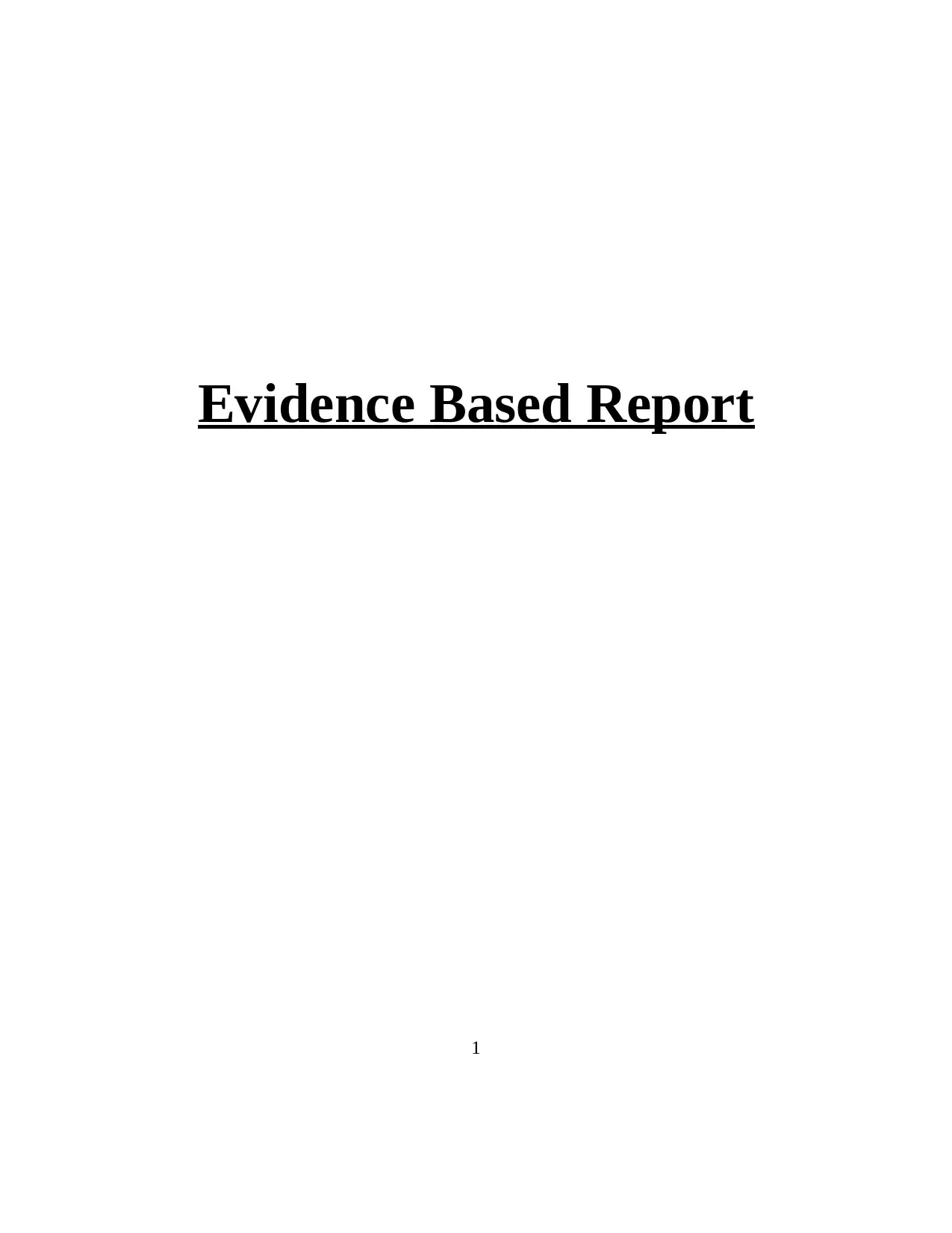
Evidence Based Report
1
1
Paraphrase This Document
Need a fresh take? Get an instant paraphrase of this document with our AI Paraphraser
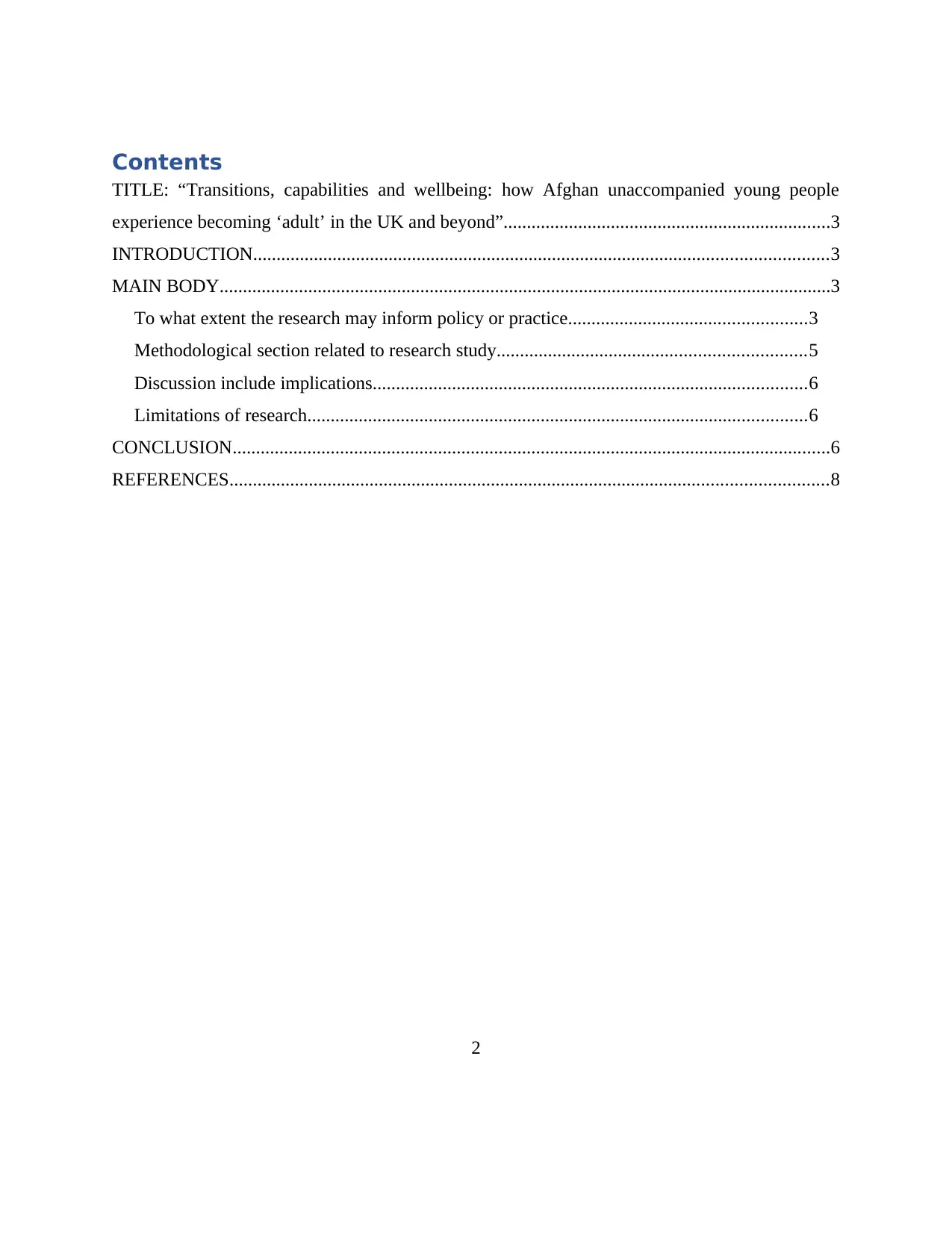
Contents
TITLE: “Transitions, capabilities and wellbeing: how Afghan unaccompanied young people
experience becoming ‘adult’ in the UK and beyond”......................................................................3
INTRODUCTION...........................................................................................................................3
MAIN BODY...................................................................................................................................3
To what extent the research may inform policy or practice...................................................3
Methodological section related to research study..................................................................5
Discussion include implications.............................................................................................6
Limitations of research...........................................................................................................6
CONCLUSION................................................................................................................................6
REFERENCES................................................................................................................................8
2
TITLE: “Transitions, capabilities and wellbeing: how Afghan unaccompanied young people
experience becoming ‘adult’ in the UK and beyond”......................................................................3
INTRODUCTION...........................................................................................................................3
MAIN BODY...................................................................................................................................3
To what extent the research may inform policy or practice...................................................3
Methodological section related to research study..................................................................5
Discussion include implications.............................................................................................6
Limitations of research...........................................................................................................6
CONCLUSION................................................................................................................................6
REFERENCES................................................................................................................................8
2
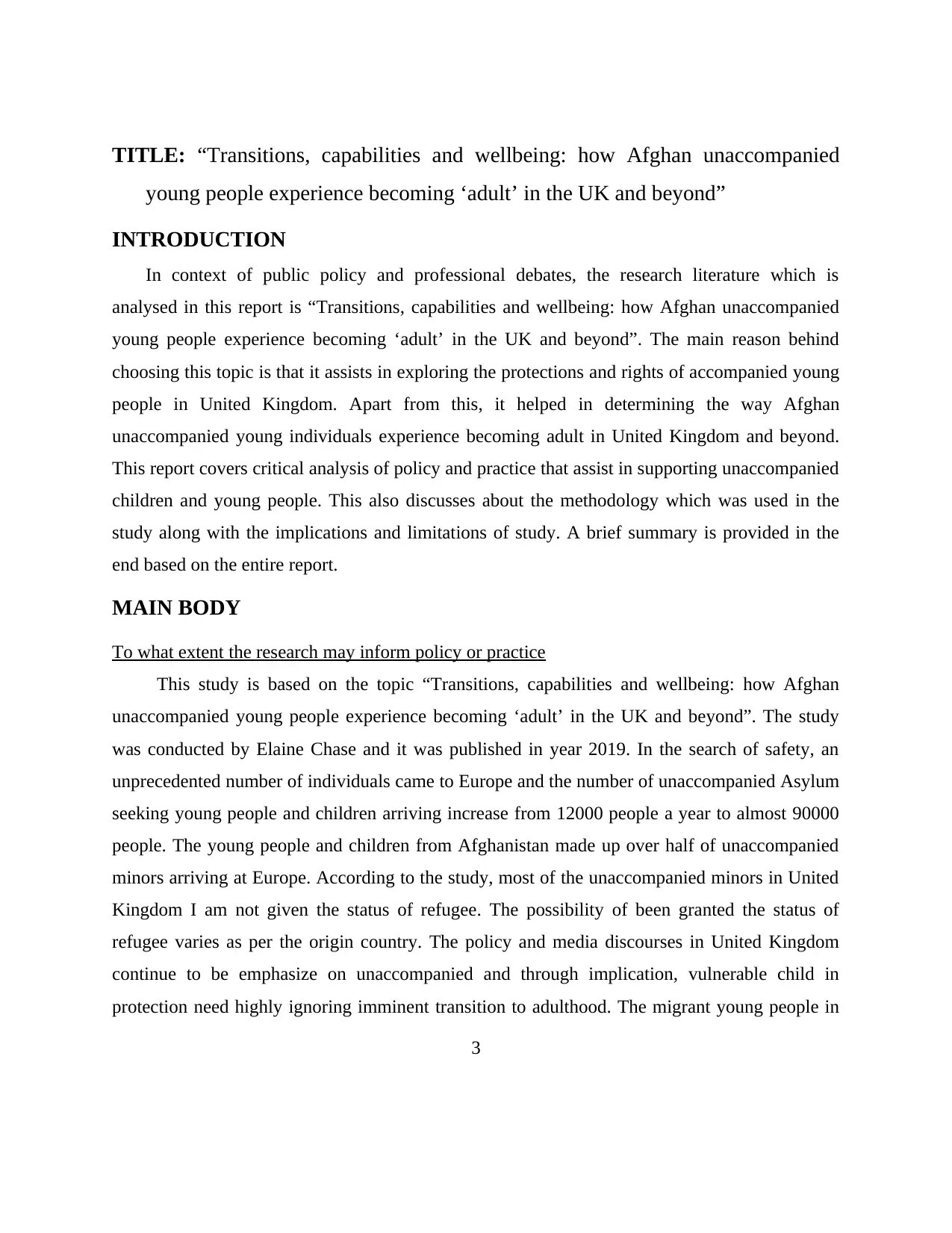
TITLE: “Transitions, capabilities and wellbeing: how Afghan unaccompanied
young people experience becoming ‘adult’ in the UK and beyond”
INTRODUCTION
In context of public policy and professional debates, the research literature which is
analysed in this report is “Transitions, capabilities and wellbeing: how Afghan unaccompanied
young people experience becoming ‘adult’ in the UK and beyond”. The main reason behind
choosing this topic is that it assists in exploring the protections and rights of accompanied young
people in United Kingdom. Apart from this, it helped in determining the way Afghan
unaccompanied young individuals experience becoming adult in United Kingdom and beyond.
This report covers critical analysis of policy and practice that assist in supporting unaccompanied
children and young people. This also discusses about the methodology which was used in the
study along with the implications and limitations of study. A brief summary is provided in the
end based on the entire report.
MAIN BODY
To what extent the research may inform policy or practice
This study is based on the topic “Transitions, capabilities and wellbeing: how Afghan
unaccompanied young people experience becoming ‘adult’ in the UK and beyond”. The study
was conducted by Elaine Chase and it was published in year 2019. In the search of safety, an
unprecedented number of individuals came to Europe and the number of unaccompanied Asylum
seeking young people and children arriving increase from 12000 people a year to almost 90000
people. The young people and children from Afghanistan made up over half of unaccompanied
minors arriving at Europe. According to the study, most of the unaccompanied minors in United
Kingdom I am not given the status of refugee. The possibility of been granted the status of
refugee varies as per the origin country. The policy and media discourses in United Kingdom
continue to be emphasize on unaccompanied and through implication, vulnerable child in
protection need highly ignoring imminent transition to adulthood. The migrant young people in
3
young people experience becoming ‘adult’ in the UK and beyond”
INTRODUCTION
In context of public policy and professional debates, the research literature which is
analysed in this report is “Transitions, capabilities and wellbeing: how Afghan unaccompanied
young people experience becoming ‘adult’ in the UK and beyond”. The main reason behind
choosing this topic is that it assists in exploring the protections and rights of accompanied young
people in United Kingdom. Apart from this, it helped in determining the way Afghan
unaccompanied young individuals experience becoming adult in United Kingdom and beyond.
This report covers critical analysis of policy and practice that assist in supporting unaccompanied
children and young people. This also discusses about the methodology which was used in the
study along with the implications and limitations of study. A brief summary is provided in the
end based on the entire report.
MAIN BODY
To what extent the research may inform policy or practice
This study is based on the topic “Transitions, capabilities and wellbeing: how Afghan
unaccompanied young people experience becoming ‘adult’ in the UK and beyond”. The study
was conducted by Elaine Chase and it was published in year 2019. In the search of safety, an
unprecedented number of individuals came to Europe and the number of unaccompanied Asylum
seeking young people and children arriving increase from 12000 people a year to almost 90000
people. The young people and children from Afghanistan made up over half of unaccompanied
minors arriving at Europe. According to the study, most of the unaccompanied minors in United
Kingdom I am not given the status of refugee. The possibility of been granted the status of
refugee varies as per the origin country. The policy and media discourses in United Kingdom
continue to be emphasize on unaccompanied and through implication, vulnerable child in
protection need highly ignoring imminent transition to adulthood. The migrant young people in
3
⊘ This is a preview!⊘
Do you want full access?
Subscribe today to unlock all pages.

Trusted by 1+ million students worldwide
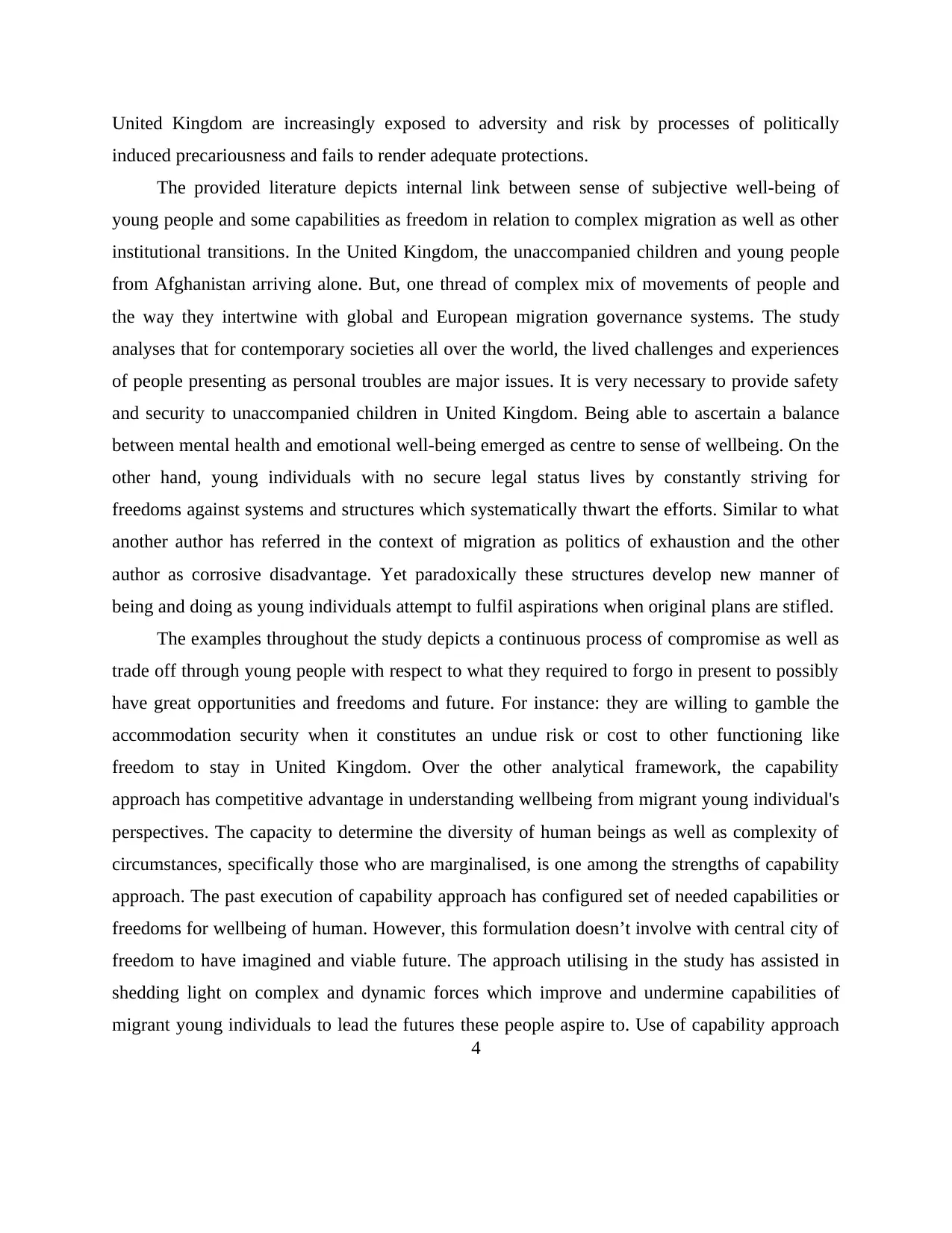
United Kingdom are increasingly exposed to adversity and risk by processes of politically
induced precariousness and fails to render adequate protections.
The provided literature depicts internal link between sense of subjective well-being of
young people and some capabilities as freedom in relation to complex migration as well as other
institutional transitions. In the United Kingdom, the unaccompanied children and young people
from Afghanistan arriving alone. But, one thread of complex mix of movements of people and
the way they intertwine with global and European migration governance systems. The study
analyses that for contemporary societies all over the world, the lived challenges and experiences
of people presenting as personal troubles are major issues. It is very necessary to provide safety
and security to unaccompanied children in United Kingdom. Being able to ascertain a balance
between mental health and emotional well-being emerged as centre to sense of wellbeing. On the
other hand, young individuals with no secure legal status lives by constantly striving for
freedoms against systems and structures which systematically thwart the efforts. Similar to what
another author has referred in the context of migration as politics of exhaustion and the other
author as corrosive disadvantage. Yet paradoxically these structures develop new manner of
being and doing as young individuals attempt to fulfil aspirations when original plans are stifled.
The examples throughout the study depicts a continuous process of compromise as well as
trade off through young people with respect to what they required to forgo in present to possibly
have great opportunities and freedoms and future. For instance: they are willing to gamble the
accommodation security when it constitutes an undue risk or cost to other functioning like
freedom to stay in United Kingdom. Over the other analytical framework, the capability
approach has competitive advantage in understanding wellbeing from migrant young individual's
perspectives. The capacity to determine the diversity of human beings as well as complexity of
circumstances, specifically those who are marginalised, is one among the strengths of capability
approach. The past execution of capability approach has configured set of needed capabilities or
freedoms for wellbeing of human. However, this formulation doesn’t involve with central city of
freedom to have imagined and viable future. The approach utilising in the study has assisted in
shedding light on complex and dynamic forces which improve and undermine capabilities of
migrant young individuals to lead the futures these people aspire to. Use of capability approach
4
induced precariousness and fails to render adequate protections.
The provided literature depicts internal link between sense of subjective well-being of
young people and some capabilities as freedom in relation to complex migration as well as other
institutional transitions. In the United Kingdom, the unaccompanied children and young people
from Afghanistan arriving alone. But, one thread of complex mix of movements of people and
the way they intertwine with global and European migration governance systems. The study
analyses that for contemporary societies all over the world, the lived challenges and experiences
of people presenting as personal troubles are major issues. It is very necessary to provide safety
and security to unaccompanied children in United Kingdom. Being able to ascertain a balance
between mental health and emotional well-being emerged as centre to sense of wellbeing. On the
other hand, young individuals with no secure legal status lives by constantly striving for
freedoms against systems and structures which systematically thwart the efforts. Similar to what
another author has referred in the context of migration as politics of exhaustion and the other
author as corrosive disadvantage. Yet paradoxically these structures develop new manner of
being and doing as young individuals attempt to fulfil aspirations when original plans are stifled.
The examples throughout the study depicts a continuous process of compromise as well as
trade off through young people with respect to what they required to forgo in present to possibly
have great opportunities and freedoms and future. For instance: they are willing to gamble the
accommodation security when it constitutes an undue risk or cost to other functioning like
freedom to stay in United Kingdom. Over the other analytical framework, the capability
approach has competitive advantage in understanding wellbeing from migrant young individual's
perspectives. The capacity to determine the diversity of human beings as well as complexity of
circumstances, specifically those who are marginalised, is one among the strengths of capability
approach. The past execution of capability approach has configured set of needed capabilities or
freedoms for wellbeing of human. However, this formulation doesn’t involve with central city of
freedom to have imagined and viable future. The approach utilising in the study has assisted in
shedding light on complex and dynamic forces which improve and undermine capabilities of
migrant young individuals to lead the futures these people aspire to. Use of capability approach
4
Paraphrase This Document
Need a fresh take? Get an instant paraphrase of this document with our AI Paraphraser
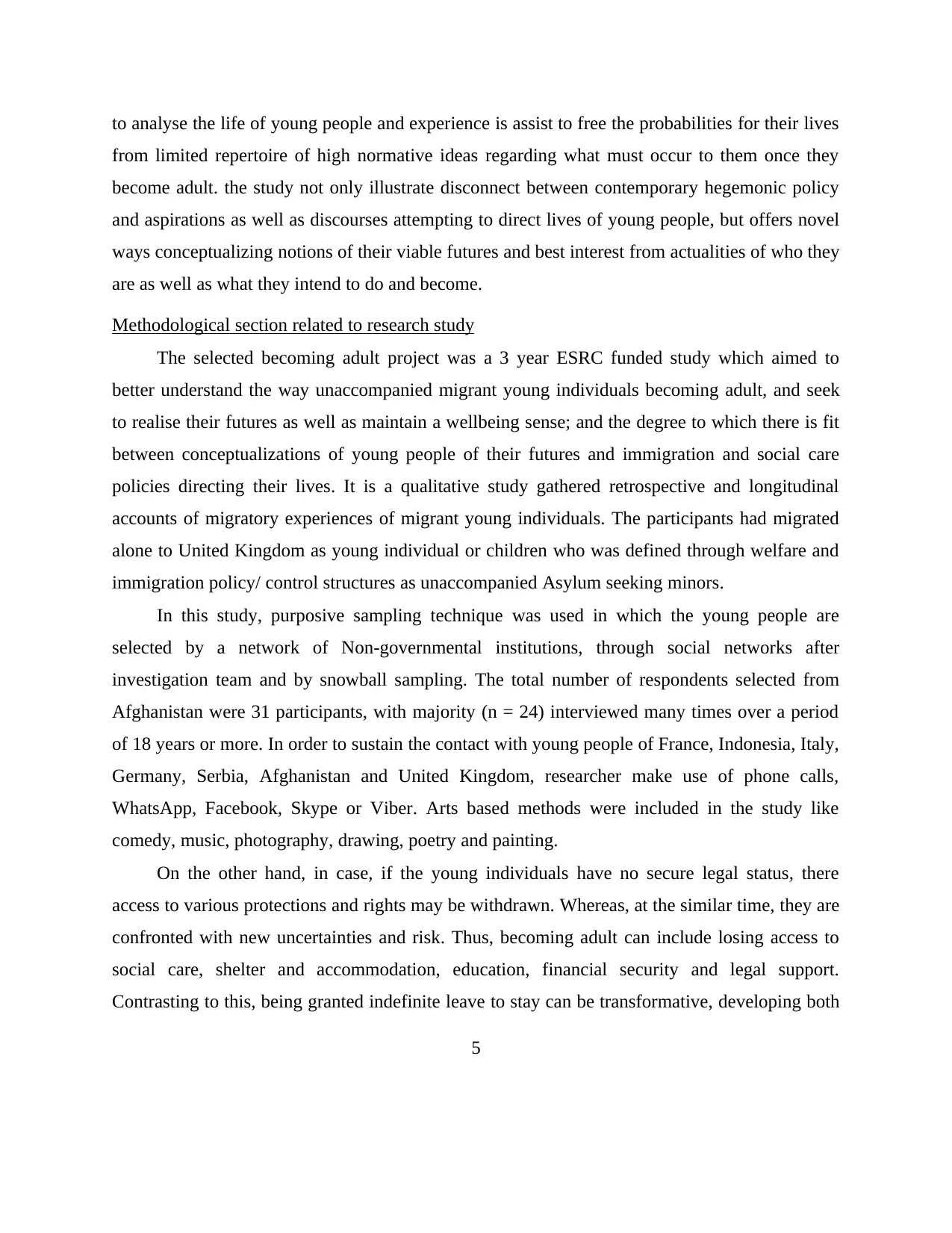
to analyse the life of young people and experience is assist to free the probabilities for their lives
from limited repertoire of high normative ideas regarding what must occur to them once they
become adult. the study not only illustrate disconnect between contemporary hegemonic policy
and aspirations as well as discourses attempting to direct lives of young people, but offers novel
ways conceptualizing notions of their viable futures and best interest from actualities of who they
are as well as what they intend to do and become.
Methodological section related to research study
The selected becoming adult project was a 3 year ESRC funded study which aimed to
better understand the way unaccompanied migrant young individuals becoming adult, and seek
to realise their futures as well as maintain a wellbeing sense; and the degree to which there is fit
between conceptualizations of young people of their futures and immigration and social care
policies directing their lives. It is a qualitative study gathered retrospective and longitudinal
accounts of migratory experiences of migrant young individuals. The participants had migrated
alone to United Kingdom as young individual or children who was defined through welfare and
immigration policy/ control structures as unaccompanied Asylum seeking minors.
In this study, purposive sampling technique was used in which the young people are
selected by a network of Non-governmental institutions, through social networks after
investigation team and by snowball sampling. The total number of respondents selected from
Afghanistan were 31 participants, with majority (n = 24) interviewed many times over a period
of 18 years or more. In order to sustain the contact with young people of France, Indonesia, Italy,
Germany, Serbia, Afghanistan and United Kingdom, researcher make use of phone calls,
WhatsApp, Facebook, Skype or Viber. Arts based methods were included in the study like
comedy, music, photography, drawing, poetry and painting.
On the other hand, in case, if the young individuals have no secure legal status, there
access to various protections and rights may be withdrawn. Whereas, at the similar time, they are
confronted with new uncertainties and risk. Thus, becoming adult can include losing access to
social care, shelter and accommodation, education, financial security and legal support.
Contrasting to this, being granted indefinite leave to stay can be transformative, developing both
5
from limited repertoire of high normative ideas regarding what must occur to them once they
become adult. the study not only illustrate disconnect between contemporary hegemonic policy
and aspirations as well as discourses attempting to direct lives of young people, but offers novel
ways conceptualizing notions of their viable futures and best interest from actualities of who they
are as well as what they intend to do and become.
Methodological section related to research study
The selected becoming adult project was a 3 year ESRC funded study which aimed to
better understand the way unaccompanied migrant young individuals becoming adult, and seek
to realise their futures as well as maintain a wellbeing sense; and the degree to which there is fit
between conceptualizations of young people of their futures and immigration and social care
policies directing their lives. It is a qualitative study gathered retrospective and longitudinal
accounts of migratory experiences of migrant young individuals. The participants had migrated
alone to United Kingdom as young individual or children who was defined through welfare and
immigration policy/ control structures as unaccompanied Asylum seeking minors.
In this study, purposive sampling technique was used in which the young people are
selected by a network of Non-governmental institutions, through social networks after
investigation team and by snowball sampling. The total number of respondents selected from
Afghanistan were 31 participants, with majority (n = 24) interviewed many times over a period
of 18 years or more. In order to sustain the contact with young people of France, Indonesia, Italy,
Germany, Serbia, Afghanistan and United Kingdom, researcher make use of phone calls,
WhatsApp, Facebook, Skype or Viber. Arts based methods were included in the study like
comedy, music, photography, drawing, poetry and painting.
On the other hand, in case, if the young individuals have no secure legal status, there
access to various protections and rights may be withdrawn. Whereas, at the similar time, they are
confronted with new uncertainties and risk. Thus, becoming adult can include losing access to
social care, shelter and accommodation, education, financial security and legal support.
Contrasting to this, being granted indefinite leave to stay can be transformative, developing both
5
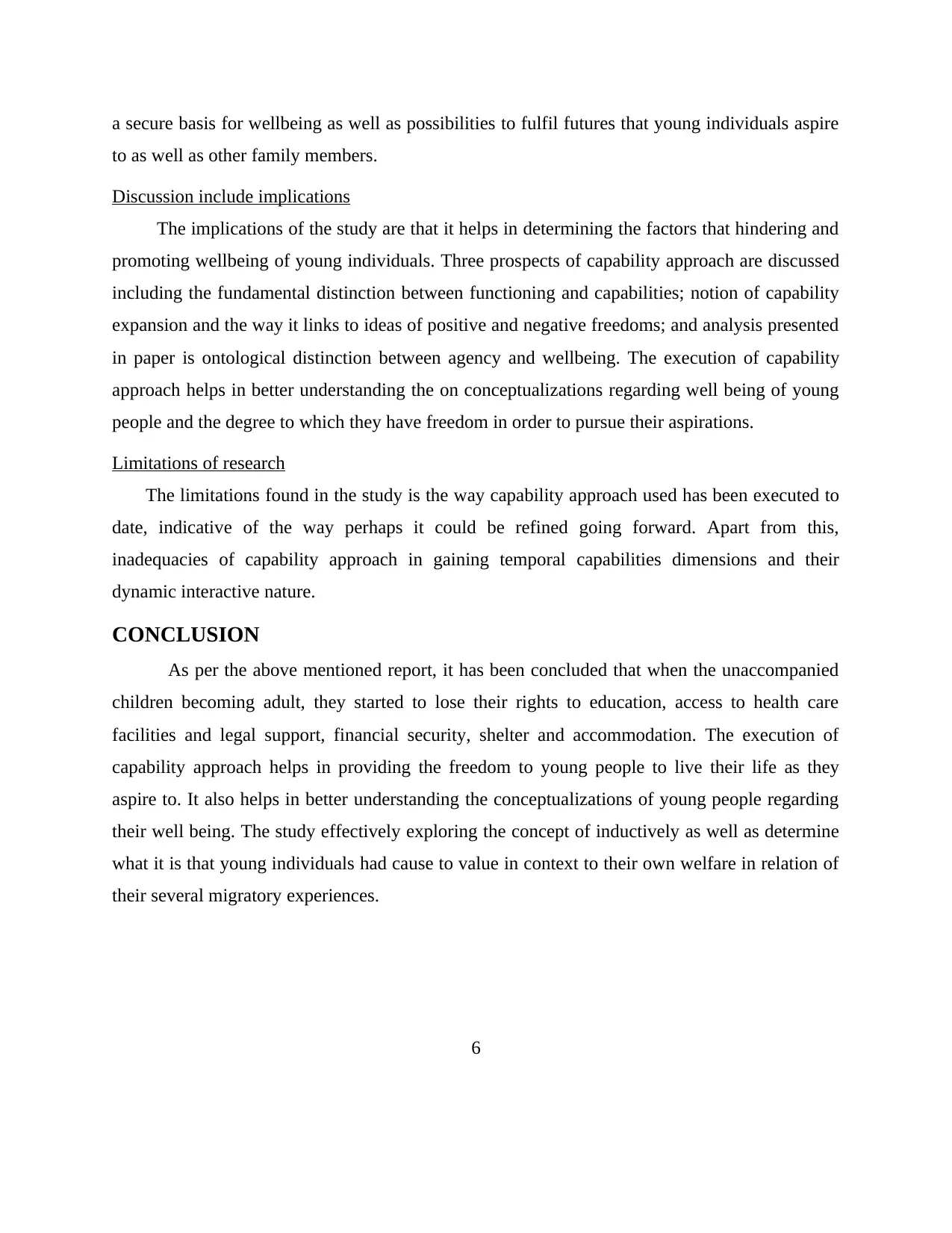
a secure basis for wellbeing as well as possibilities to fulfil futures that young individuals aspire
to as well as other family members.
Discussion include implications
The implications of the study are that it helps in determining the factors that hindering and
promoting wellbeing of young individuals. Three prospects of capability approach are discussed
including the fundamental distinction between functioning and capabilities; notion of capability
expansion and the way it links to ideas of positive and negative freedoms; and analysis presented
in paper is ontological distinction between agency and wellbeing. The execution of capability
approach helps in better understanding the on conceptualizations regarding well being of young
people and the degree to which they have freedom in order to pursue their aspirations.
Limitations of research
The limitations found in the study is the way capability approach used has been executed to
date, indicative of the way perhaps it could be refined going forward. Apart from this,
inadequacies of capability approach in gaining temporal capabilities dimensions and their
dynamic interactive nature.
CONCLUSION
As per the above mentioned report, it has been concluded that when the unaccompanied
children becoming adult, they started to lose their rights to education, access to health care
facilities and legal support, financial security, shelter and accommodation. The execution of
capability approach helps in providing the freedom to young people to live their life as they
aspire to. It also helps in better understanding the conceptualizations of young people regarding
their well being. The study effectively exploring the concept of inductively as well as determine
what it is that young individuals had cause to value in context to their own welfare in relation of
their several migratory experiences.
6
to as well as other family members.
Discussion include implications
The implications of the study are that it helps in determining the factors that hindering and
promoting wellbeing of young individuals. Three prospects of capability approach are discussed
including the fundamental distinction between functioning and capabilities; notion of capability
expansion and the way it links to ideas of positive and negative freedoms; and analysis presented
in paper is ontological distinction between agency and wellbeing. The execution of capability
approach helps in better understanding the on conceptualizations regarding well being of young
people and the degree to which they have freedom in order to pursue their aspirations.
Limitations of research
The limitations found in the study is the way capability approach used has been executed to
date, indicative of the way perhaps it could be refined going forward. Apart from this,
inadequacies of capability approach in gaining temporal capabilities dimensions and their
dynamic interactive nature.
CONCLUSION
As per the above mentioned report, it has been concluded that when the unaccompanied
children becoming adult, they started to lose their rights to education, access to health care
facilities and legal support, financial security, shelter and accommodation. The execution of
capability approach helps in providing the freedom to young people to live their life as they
aspire to. It also helps in better understanding the conceptualizations of young people regarding
their well being. The study effectively exploring the concept of inductively as well as determine
what it is that young individuals had cause to value in context to their own welfare in relation of
their several migratory experiences.
6
⊘ This is a preview!⊘
Do you want full access?
Subscribe today to unlock all pages.

Trusted by 1+ million students worldwide
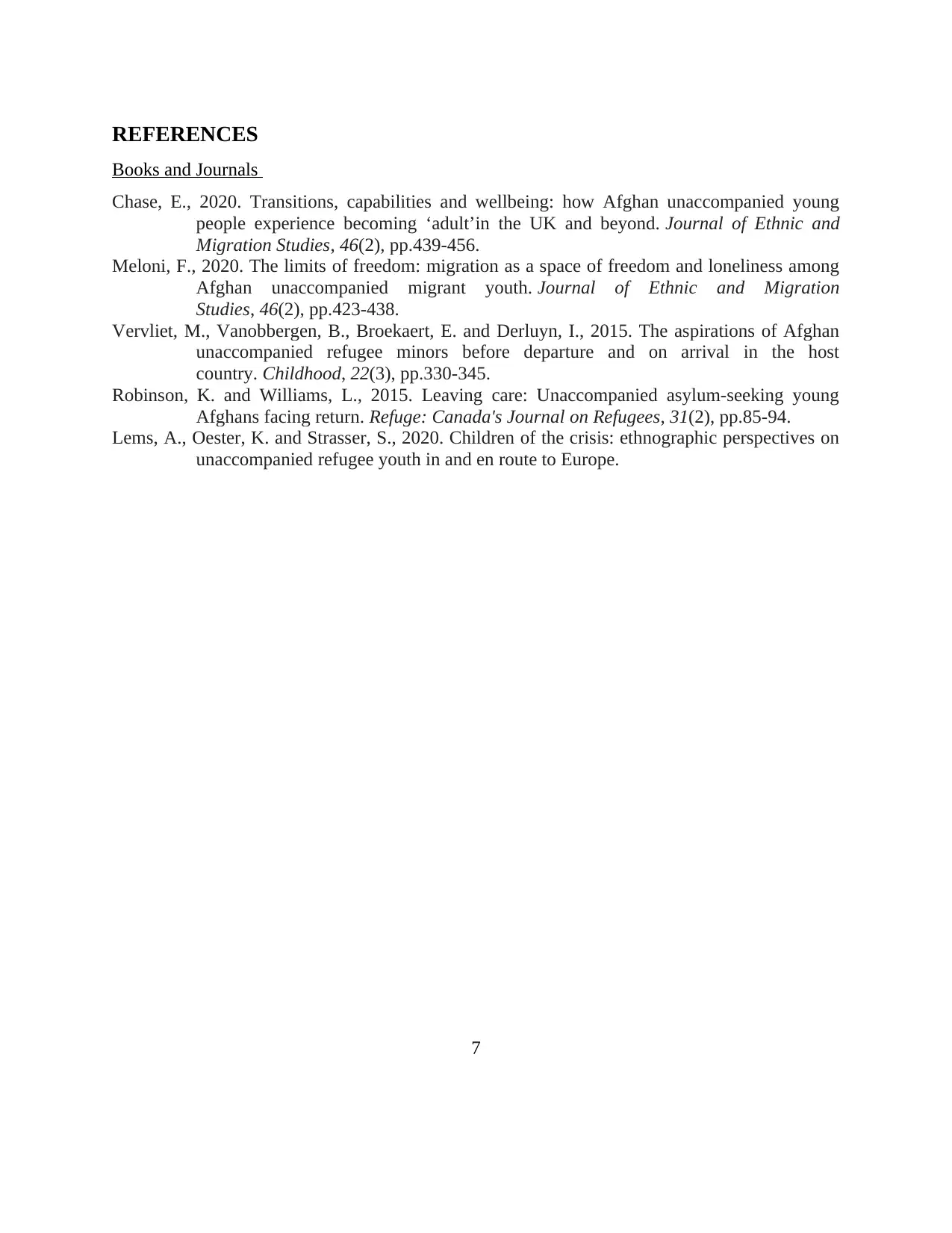
REFERENCES
Books and Journals
Chase, E., 2020. Transitions, capabilities and wellbeing: how Afghan unaccompanied young
people experience becoming ‘adult’in the UK and beyond. Journal of Ethnic and
Migration Studies, 46(2), pp.439-456.
Meloni, F., 2020. The limits of freedom: migration as a space of freedom and loneliness among
Afghan unaccompanied migrant youth. Journal of Ethnic and Migration
Studies, 46(2), pp.423-438.
Vervliet, M., Vanobbergen, B., Broekaert, E. and Derluyn, I., 2015. The aspirations of Afghan
unaccompanied refugee minors before departure and on arrival in the host
country. Childhood, 22(3), pp.330-345.
Robinson, K. and Williams, L., 2015. Leaving care: Unaccompanied asylum-seeking young
Afghans facing return. Refuge: Canada's Journal on Refugees, 31(2), pp.85-94.
Lems, A., Oester, K. and Strasser, S., 2020. Children of the crisis: ethnographic perspectives on
unaccompanied refugee youth in and en route to Europe.
7
Books and Journals
Chase, E., 2020. Transitions, capabilities and wellbeing: how Afghan unaccompanied young
people experience becoming ‘adult’in the UK and beyond. Journal of Ethnic and
Migration Studies, 46(2), pp.439-456.
Meloni, F., 2020. The limits of freedom: migration as a space of freedom and loneliness among
Afghan unaccompanied migrant youth. Journal of Ethnic and Migration
Studies, 46(2), pp.423-438.
Vervliet, M., Vanobbergen, B., Broekaert, E. and Derluyn, I., 2015. The aspirations of Afghan
unaccompanied refugee minors before departure and on arrival in the host
country. Childhood, 22(3), pp.330-345.
Robinson, K. and Williams, L., 2015. Leaving care: Unaccompanied asylum-seeking young
Afghans facing return. Refuge: Canada's Journal on Refugees, 31(2), pp.85-94.
Lems, A., Oester, K. and Strasser, S., 2020. Children of the crisis: ethnographic perspectives on
unaccompanied refugee youth in and en route to Europe.
7
1 out of 7
Your All-in-One AI-Powered Toolkit for Academic Success.
+13062052269
info@desklib.com
Available 24*7 on WhatsApp / Email
![[object Object]](/_next/static/media/star-bottom.7253800d.svg)
Unlock your academic potential
Copyright © 2020–2026 A2Z Services. All Rights Reserved. Developed and managed by ZUCOL.

